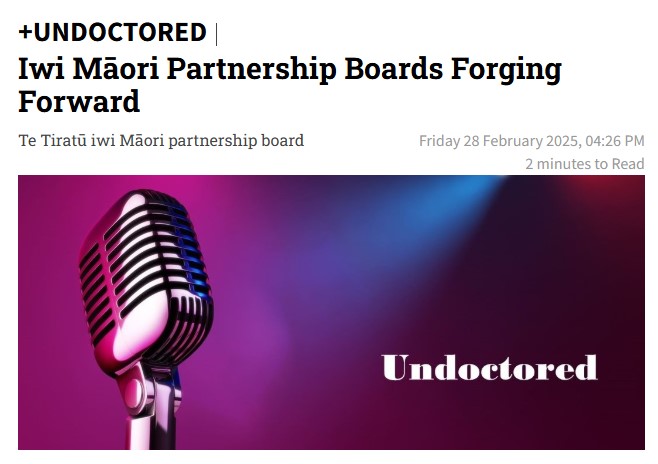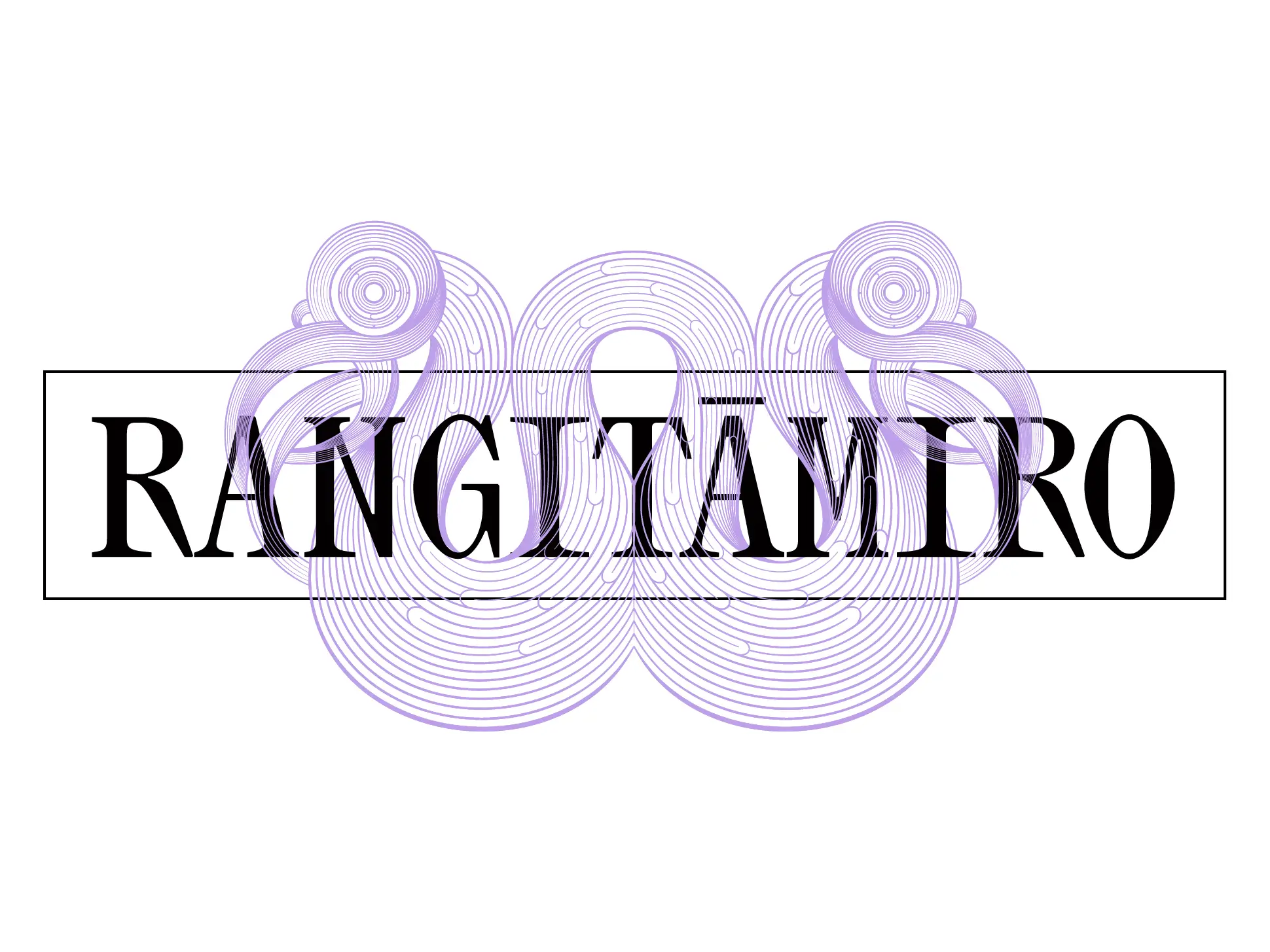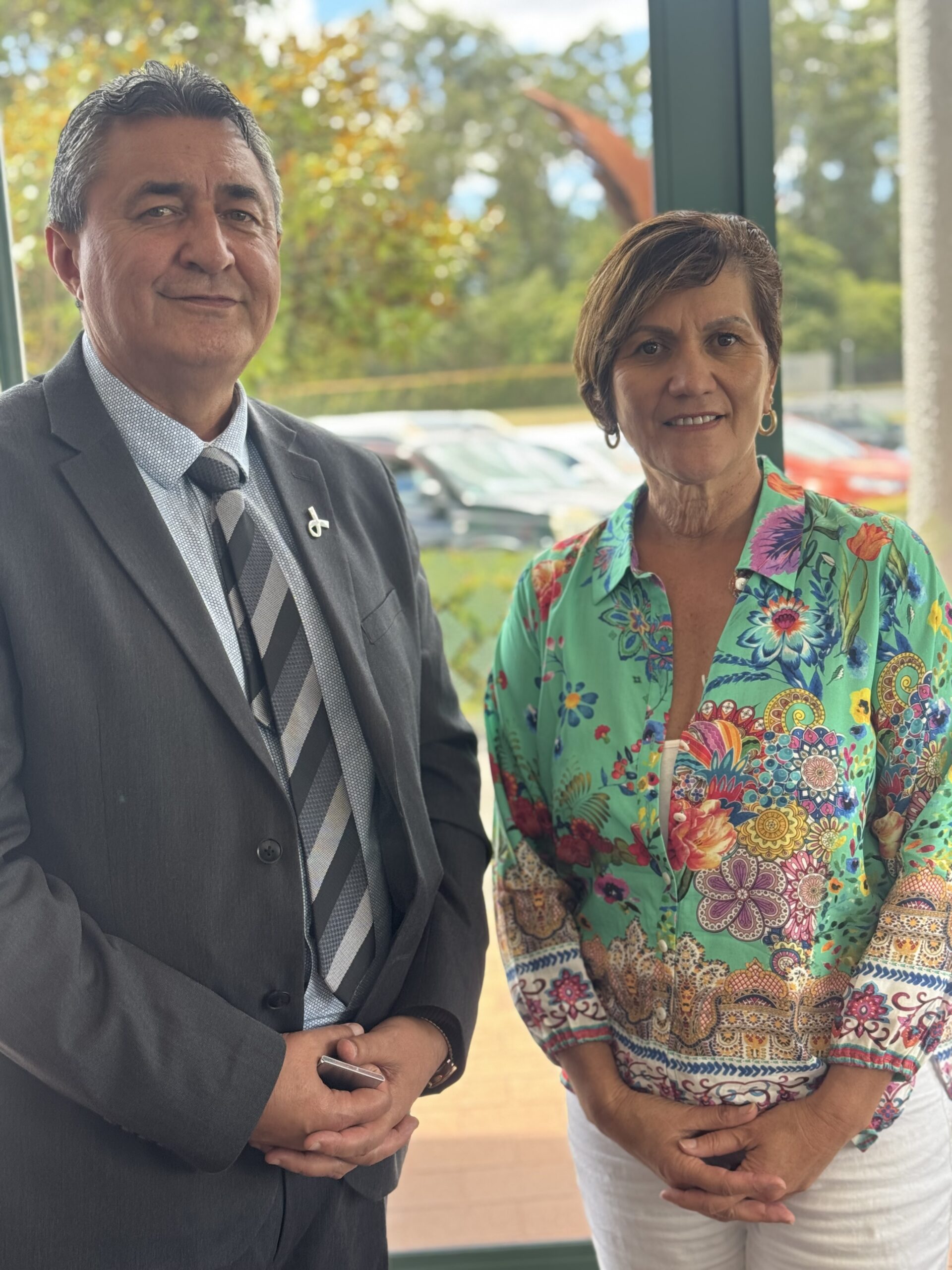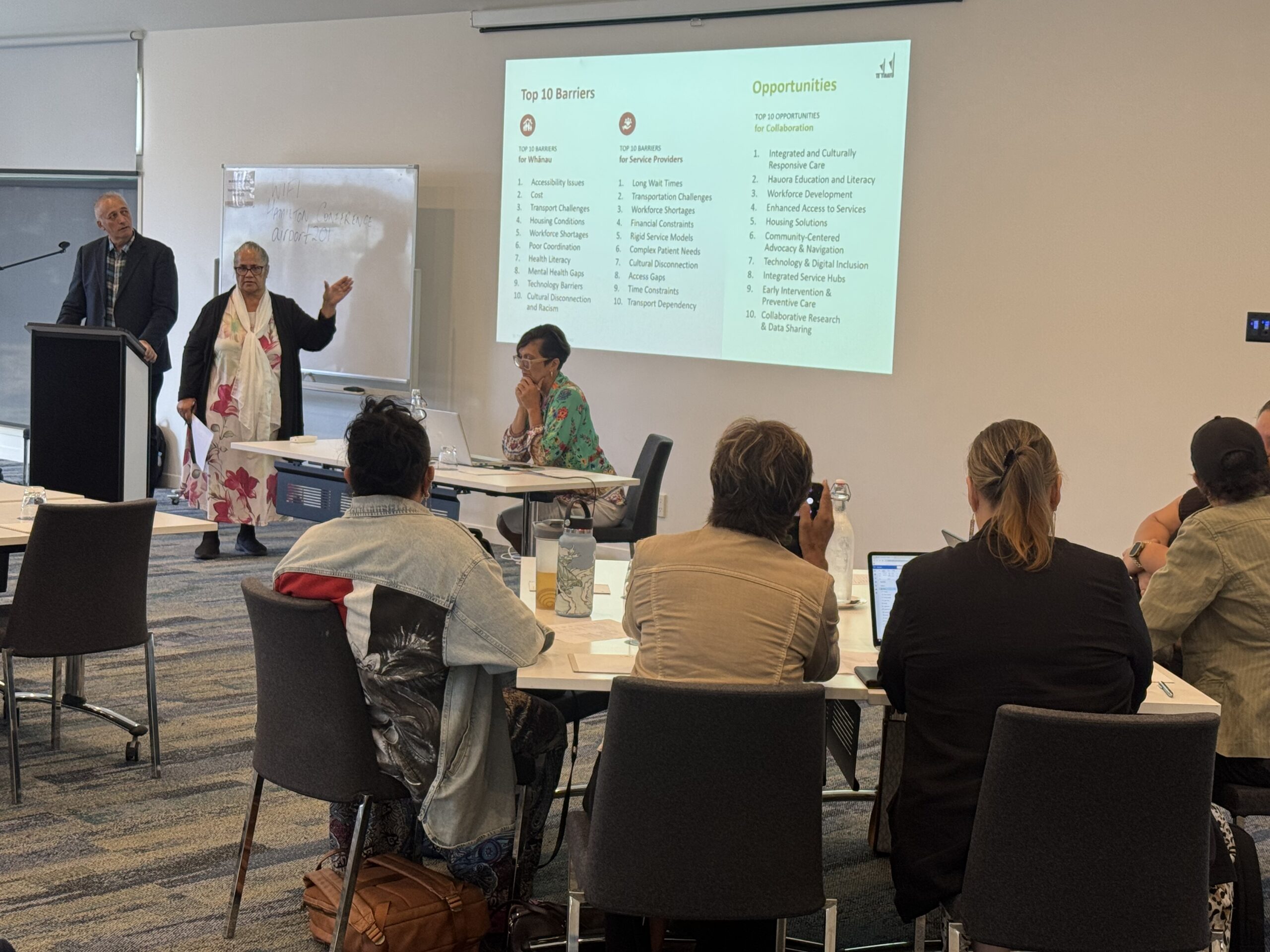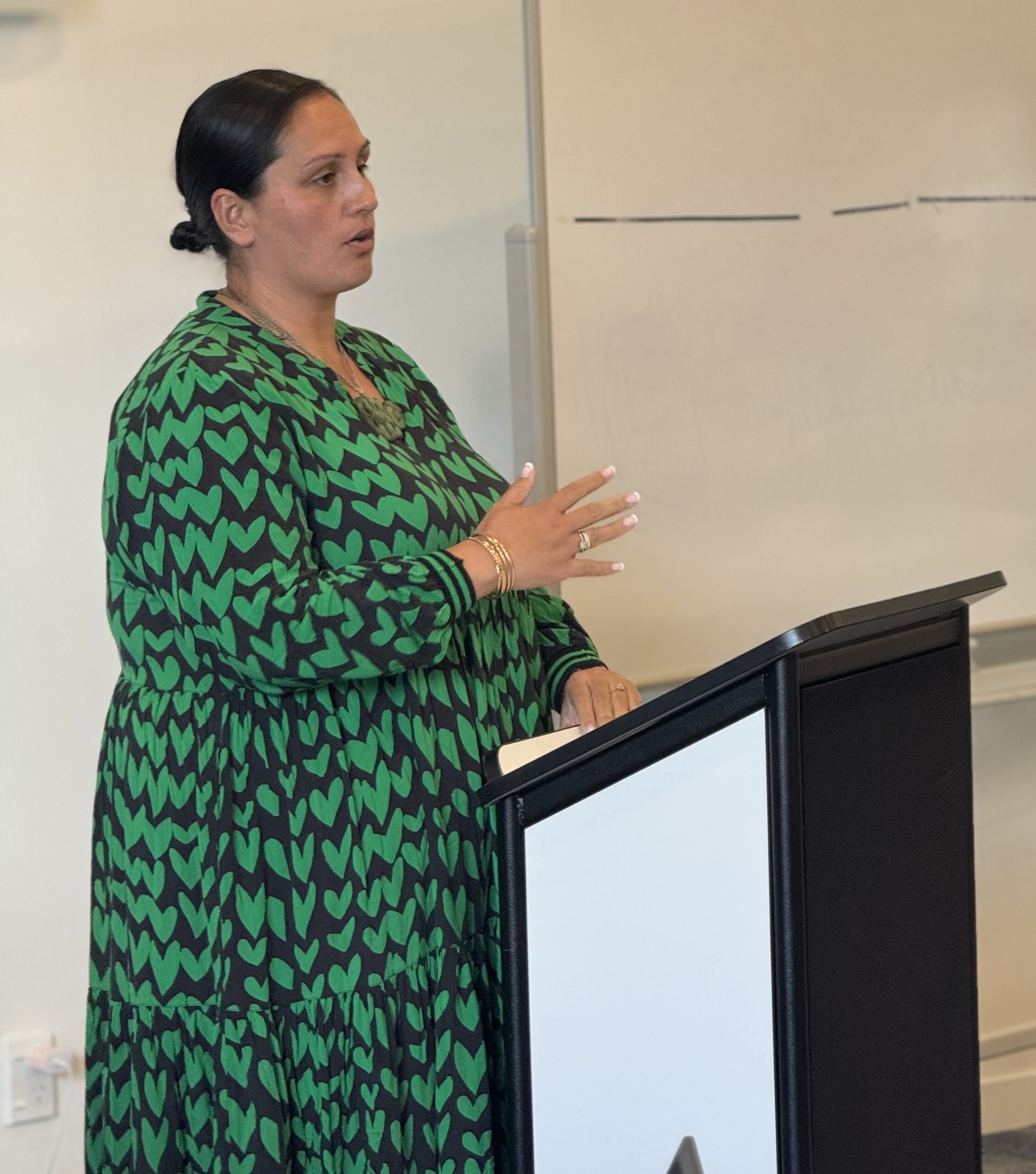Te Tiratū Iwi Māori Partnership Board hosts inaugural forum with Waikato health providers
Today marks a pivotal milestone for Māori health in the Waikato as the Te Tiratū Iwi Māori Partnership Board (IMPB) holds its first-ever forum with specific regional health providers both mainstream and Māori.
It has brought together those specifically focussed in the area of primary care and cancer to align with current reporting topics that Te Tiratū is canvassing in the community.
The hui is a vital step in realising the aspirations of the Pae Ora (Healthy Futures) Act, which mandates IMPBs to bring the voices of whānau directly into the heart of Te Whatu Ora Health New Zealand planning and decision-making.
At the heart of the discussions are insights gathered through the Whānau Voice initiative — a culturally grounded approach led by Te Tiratū kaimahi using surveys, hui, kanohi ki te kanohi kōrero, and existing research and data.
This powerful community feedback tool paints a sobering picture of the current health landscape for Māori in Waikato.
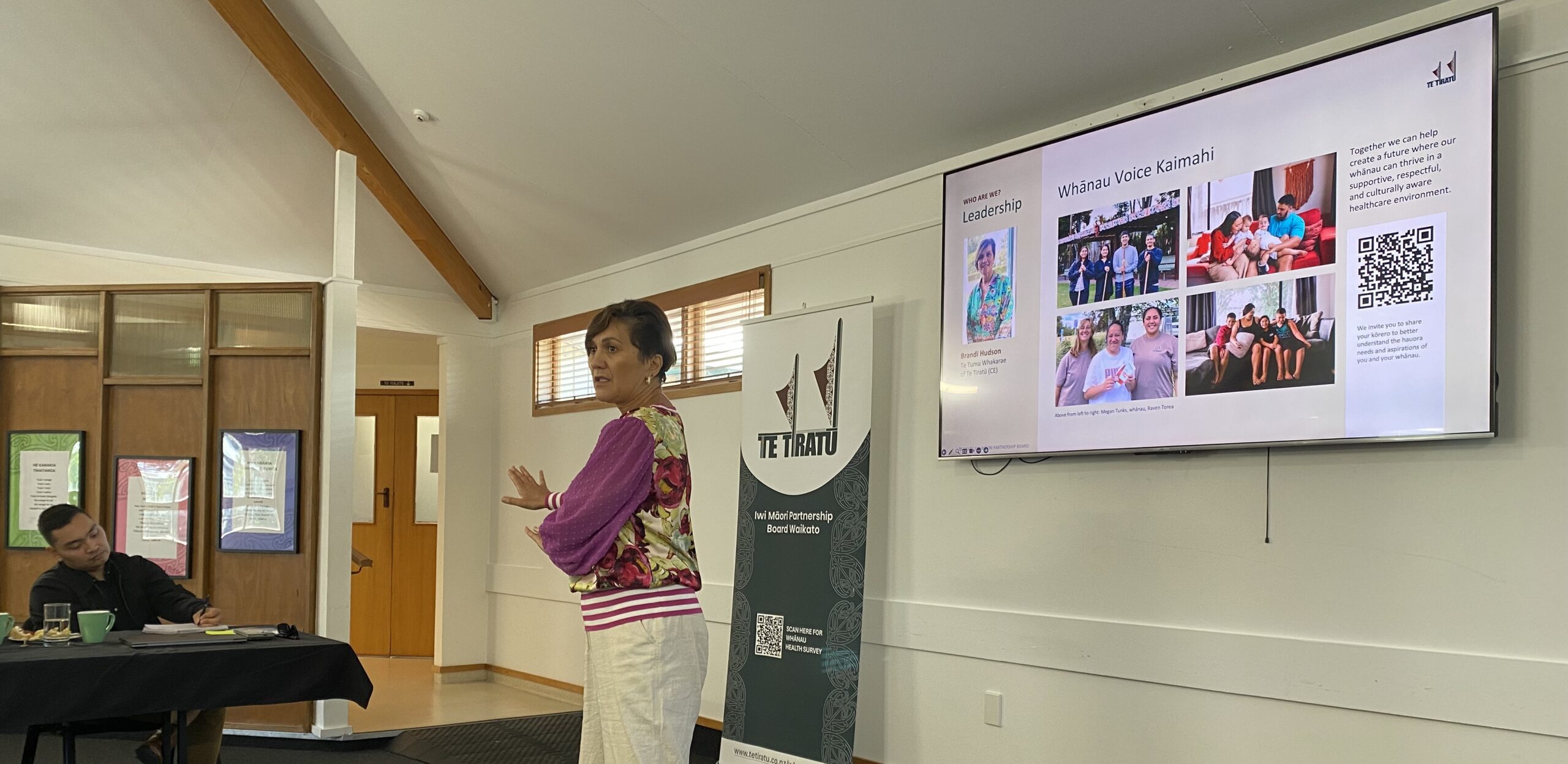
Photo: Te Tiratū Tumu Whakarae, Brandi Hudson presenting to the providers.
Key Challenges Raised by Whānau Voice:
Access & Availability
-
- Long wait times for appointments.
- Shortage of Māori-led, tamariki-focused, and mental health services.
- Disrupted continuity in GP care and low trust in the system.
- Health Navigation
- Strong call for more health and whānau navigators.
- Confusion around available services and support pathways.
- Lack of follow-up and poor communication post-diagnosis.
- Cancer Journeys
- Late diagnoses, particularly lung and prostate cancers.
- Emotional and financial strain on kaumātua caregivers.
- Gaps in transport, spiritual care, and access to rongoā Māori.
- System Gaps
- Fragmented care and poor integration between hospitals, PHOs, and services.
- Limited awareness of entitlements like travel support and Cancer Society aid.
“These stories are a clear call to action,” says Brandi Hudson, Te Tumu Whakarae of Te Tiratū.
“Whānau are asking for a system that listens, responds, and restores trust. Today’s forum is a first step in reshaping that system together with these providers who understand the lived realities of our people.”
“It’s only the start as we intend to proactively meet with many diverse stakeholders in the system operating in our regional area – Māori providers, mainstream providers, NGOs – to zero in on specific areas of interest we’re monitoring.”
Demographic Realities Driving the Urgency:
The Te Tiratū region has a youthful and growing Māori population, projected to rise from 25% in 2023 to 29% by 2043. Nearly half (48%) of Māori are under 25, demanding proactive and youth-focused planning.
At the same time, the Māori population aged 65+ is set to grow by 40% by 2043, increasing the need for age-friendly, culturally safe services for kaumātua and kuia — who already face greater financial barriers to care than their non-Māori counterparts.
Health Priorities Set by Te Tiratū IMPB:
As part of its Community Health Plan, Te Tiratū has tabled three immediate priorities with Te Whatu Ora:
- Pepe and Māmā – First 100 Days
- Māori infants face 1.5x higher rates of avoidable hospital admissions and are almost twice as likely to die as non-Māori infants.
- Hauora Hinengaro – Mental Wellbeing
- Psychological distress among Māori adults is climbing (from 11% to 18%), with 18% of the region’s 47,000 mental health-related GP visits involving Māori.
- Ngā Kaumātua me Ngā Kuia – Elders’ Health Equity
- While older Māori may delay care less frequently, they report more hardship accessing services than non-Māori peers.
Today’s forum is the first of many to come facilitated by Te Tiratū IMPB uniting health system stakeholders to explore and respond to the latest Whānau Voice insights.
“Whānau Voice is not just a report — it’s a relationship,” says Hudson.
“The insights shared come from trust built kanohi ki te kanohi. That’s what our health system needs more of: trust, connection, and commitment to Māori solutions.”
Providers speak up: Te Tiratū forum sparks call for action
Ethos Café in Hamilton provided the perfect backdrop for a powerful first forum hosted by Te Tiratū bringing together a diverse group of health service providers both Māori and mainstream, all committed to transforming outcomes for whānau Māori.
In what participants described as a much needed wānanga, the gathering offered a valuable opportunity to share insights, reconnect with kaupapa Māori approaches to health, and explore how collective action can drive change. It also allowed Te Tiratū Tumu Whakarae, Brandi Hudson to showcase the mahi of the Iwi Māori partnership Board to the providers, strengthening ties across the sector.
At the heart of the discussion was Whānau Voice — a critical reporting tool developed by all Iwi Māori Partnership Boards (IMPBs) to meet obligations under the Pae Ora Act. Providers acknowledged the potential of Whānau Voice to be powerful in advocacy when influencing Te Whatu Ora’s policies, planning, and resourcing — particularly around cancer care, screening, and primary care. Te Tiratū is specifically surveying whānau currently using Whānau Voice on their experiences of primary care and/or cancer screening and treatment.
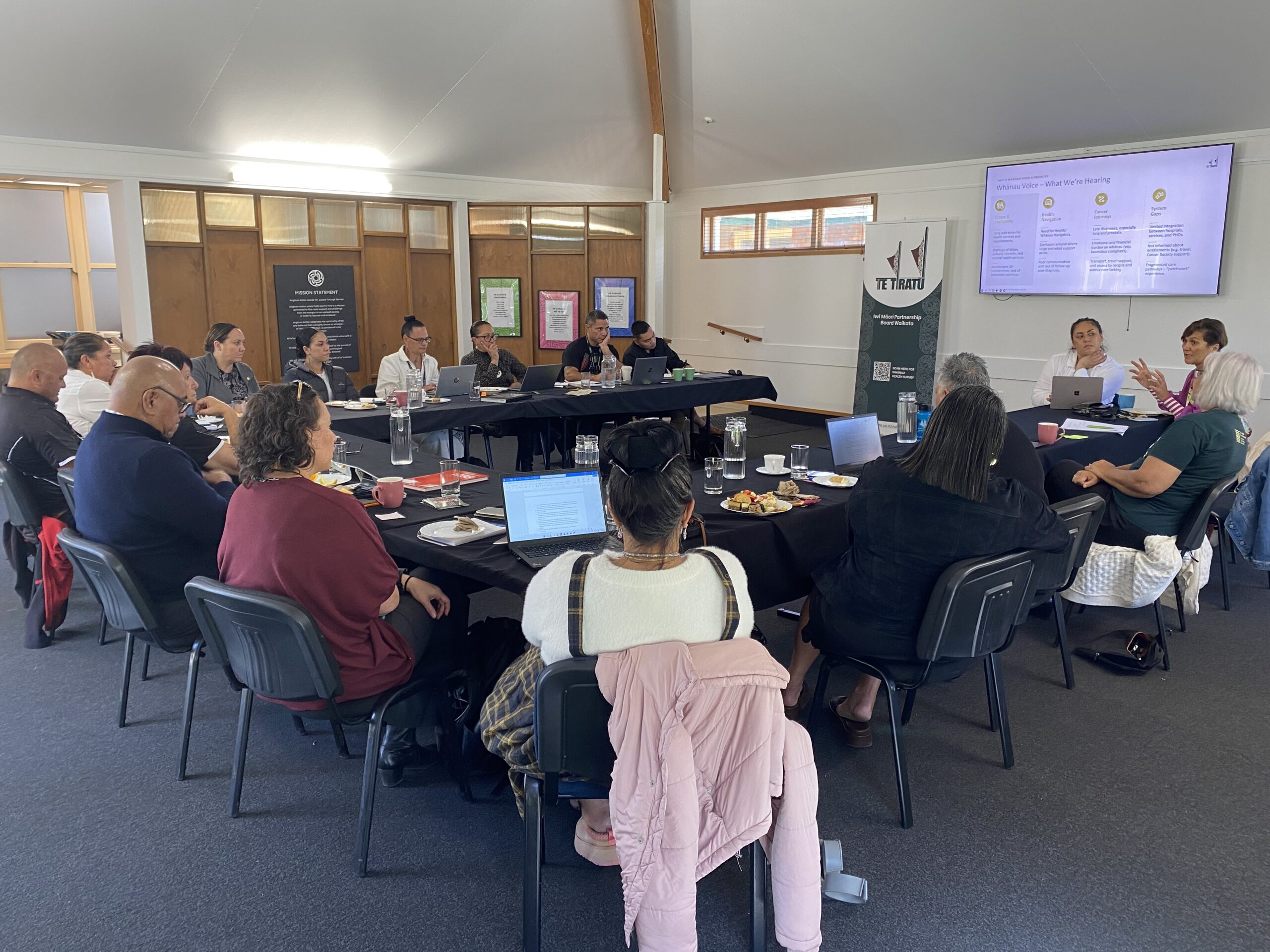
However, the forum also surfaced shared frustrations: much of the data currently collected ends up buried in compliance reporting, with little meaningful action taken. “We’re ticking boxes, not transforming outcomes,” one provider noted. There was strong consensus that this could — and should — change, and that collaboration is the key.
“We want to work smarter, not harder,” was a recurring theme, especially around data sovereignty, coordination, and the need for intentional and culturally grounded collection methods.
A System Struggling, Whānau Paying the Price
Many participants voiced deep concern about the ongoing challenges whānau face navigating a fragmented and under-resourced health system. From late-stage cancer diagnoses to traumatic hospital experiences, the stories shared painted a powerful picture of a system that is not working—especially for Māori.
Several attendees noted that the current model is failing to keep pace with the lived realities of Māori communities. With the Māori population in Waikato continuing to grow, serious questions were raised about the system’s readiness to care for a rising number of kaumātua—and what actions need to be taken now to prepare for the future.
The importance of strong, accessible primary care emerged as a key theme. Providers emphasised that GP enrolment is a vital point of early intervention, preventing avoidable Emergency Department visits and worsening health conditions. Yet the system continues to place barriers in the way of access.
Transport was raised as a significant obstacle. The high cost of fuel and parking makes regular medical appointments out of reach for many Māori. For those in rural areas, attending hospital-based specialist appointments is often impossible—not just due to distance, but because they also require overnight accommodation to manage the time, travel, and exhaustion involved. Participants were clear: practical solutions to these challenges must be prioritised now.
Partnerships, Innovation, and Hope
Despite the challenges, the mood was hopeful. Many providers expressed a clear desire to continue meeting, strategising, and aligning efforts across the region. Initiatives such as the Mangatoto Pā clinic and digital consultations were celebrated as steps forward, especially for whānau who feel safer and more respected in marae-based or online environments.
One moving example was shared of a dedicated cancer nurse walking alongside rangatahi on their cancer journey, showing the powerful impact of culturally responsive, whānau-centred care. These stories of dedication stood in contrast to the many accounts of systemic failure — reinforcing why Māori-led solutions are so essential.
Providers also recognised the need to rebuild trust with whānau, many of whom have become disengaged after repeated negative experiences. This means creating space for patient-led approaches and ensuring services are delivered in the right way, at the right time.
From a young adult cancer patient’s plea for less “doom and gloom” to calls for more rongoā, karakia, and time for kōrero — the messages were clear: we need a system grounded in humanity, connection, and tino rangatiratanga.
Te Tiratū launches first bi-monthly newsletter
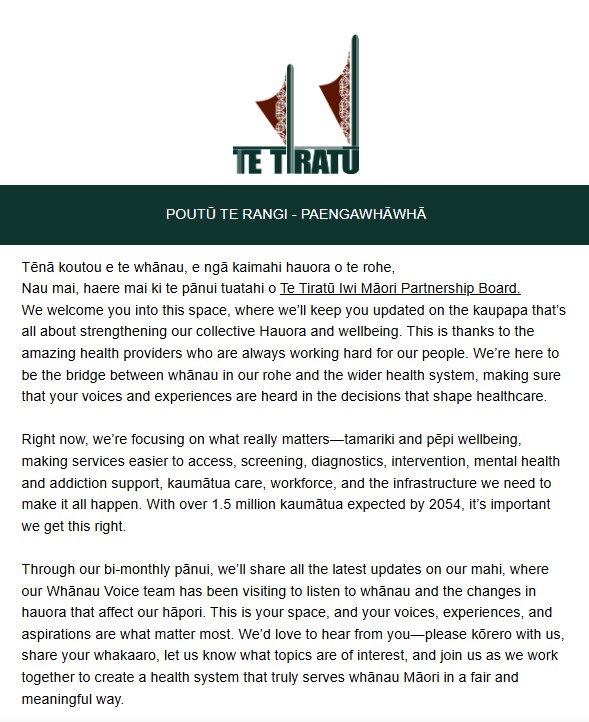
A new chapter begins as we launch our first bi-monthly newsletter, a space dedicated to keeping whānau informed and engaged in the kaupapa of strengthening our collective hauora and wellbeing. This is an opportunity to connect, share, and advocate for a health system that truly serves our people.
With a clear focus on priority areas such as tamariki and pēpi wellbeing, kaumātua care, mental health and addiction support, and workforce development, we are committed to making access to care easier and more effective for all.
Our newsletter brings you the latest updates on our mahi, insights from our Whānau Voice team, and highlight the changes in hauora that directly impact our hāpori. This is a platform for you—to share your experiences, your aspirations, and your thoughts on what matters most. By working together, we can shape a health system that upholds the values of fairness and equity for whānau Māori.
Our journey has already gained momentum. In recent months, Te Tiratū has been deeply engaged in advocating for whānau needs at both regional and national levels. From presenting our Community Health Plan to Te Whatu Ora Midland Te Manawa Taki to hosting iwi-led discussions on data sovereignty and strengthening Māori health providers, every step has been about creating real solutions driven by whānau voices. We have also raised awareness through the media on key issues such as inequitable access to bowel screening, ensuring that our advocacy reaches decision-makers and the public alike.
We invite you to be part of the journey. Share your whakaaro, engage with us at local events, and help shape the future of hauora for our people. Together, we can make a difference.
Read the full edition HERE
Sign up HERE
Honouring our Kuini: A historic first regatta of celebration and connection
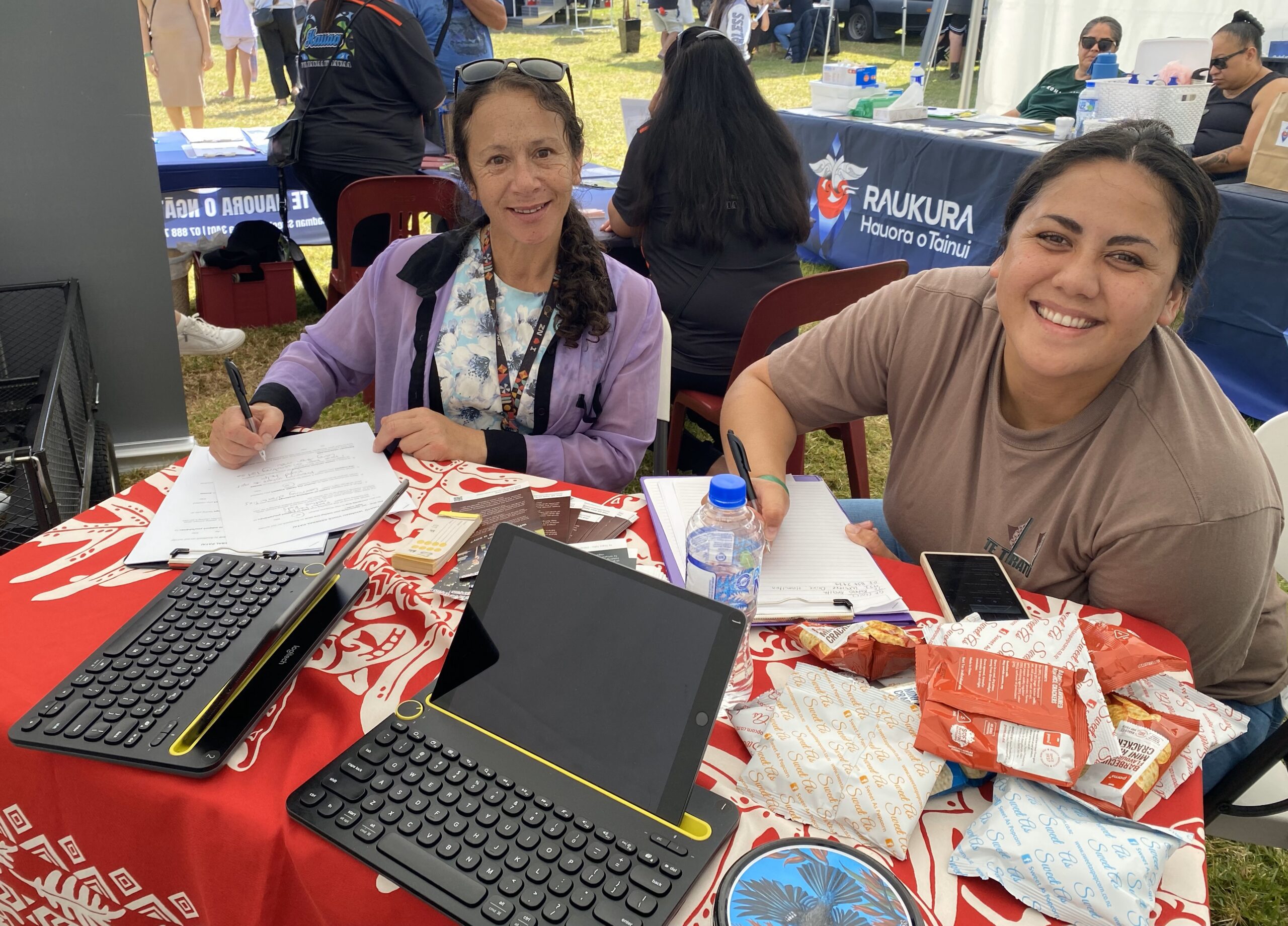
Photo: One of our Whānau Voice team in the brown Te Tiratū tee, Raven Torea with whānau completing our survey.
Our Whānau Voice team was proud to embody manaakitanga and whakawhanaungatanga at the historic first Tūrangawaewae Regatta hosted by Te Arikinui Kuini Ngā wai hono i te pō held on Saturday. This significant event in Ngāruawāhia on Te Awa o Waikato allowed us to connect with whānau, engage with an amazing rōpū of Māori providers, and raise awareness about Te Tiratū.
A Day of Connection and Insights
The regatta was buzzing with energy, and we were right in the heart of it sharing space alongside other hauora providers. With their seasoned experience at all sorts of community events across the motu, their mastery shone in with how they genuinely engage with whānau that we appreciated firsthand.
QR Codes: A Simple Way for Whānau to Have Their Say!
Between talking with whānau, handing out flyers, and having quick, meaningful kōrero, we juggled it all while writing up some in-depth surveys. Our bright new banner made it easy for whānau to find us, and they loved the custom QR code on our flyers—that instantly connects in one quick scan to our survey online which can be completed at a time that suits whānau.
Listening and Learning from Whānau
Whānau opened up about the struggles they face daily—long waits for urgent and planned healthcare, a serious lack of mental health support for tamariki, and paediatric services so stretched that appointments take months to secure. Rural communities feel the gap even more, with limited healthcare options adding to the challenge.
Finding safe, affordable housing remains an uphill battle, and for many, the dream of financial stability feels just out of reach. Job opportunities are scarce, and saving pūtea to secure a better future is often met with barriers beyond their control.
Many whānau shared that they simply don’t know where to turn for support, reinforcing the need for clearer, more accessible information about services that could help lighten the load.
Amidst these challenges, there is strong hope. The call for iwi-led, integrated health services is growing, with whānau seeing these as a pathway to better, more culturally grounded care. Key members of our hapori offered valuable insights, paving the way for solutions that are shaped by whānau, for whānau.
Acknowledgements
We extend our heartfelt thanks to all the whānau that took the time to come inside our stall in the ‘hauora area’ to share their experiences, and kōrero about how we can work together for a better future. We look forward to continuing these conversations and driving meaningful change for our whānau and communities.
Ka mau te wehi! A great day, great learnings, and listening’s for Te Tiratua Iwi Māori Partnership Board.
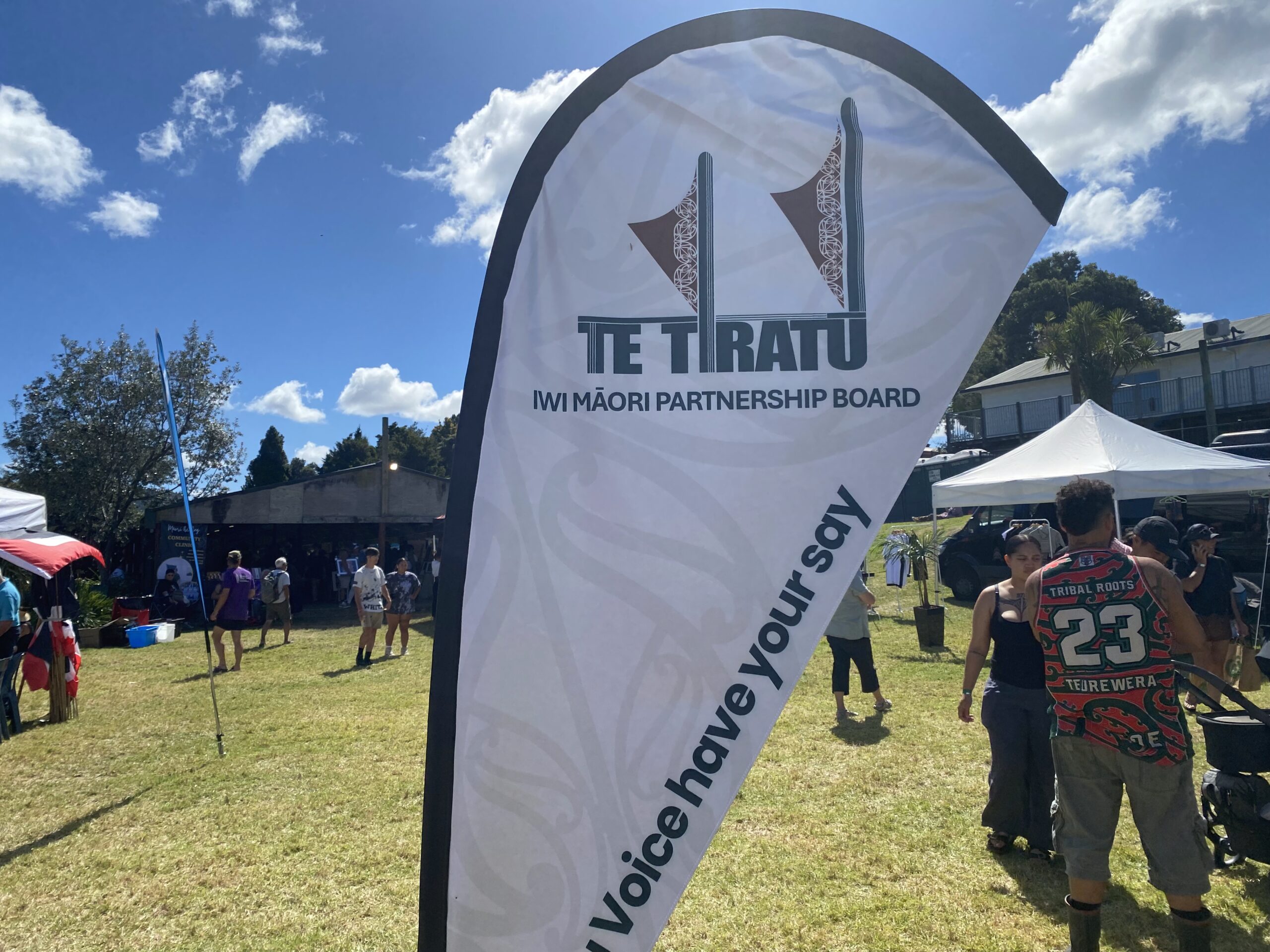
Rangitāmiro Whānau Ora transition pānui
PANUI FOR WHĀNAU ORA PROVIDERS
IN TĀMAKI MAKAURAU & TE TAI TOKERAU
Tuesday 24 March 2025, 6:00 PM
2 minutes to Read
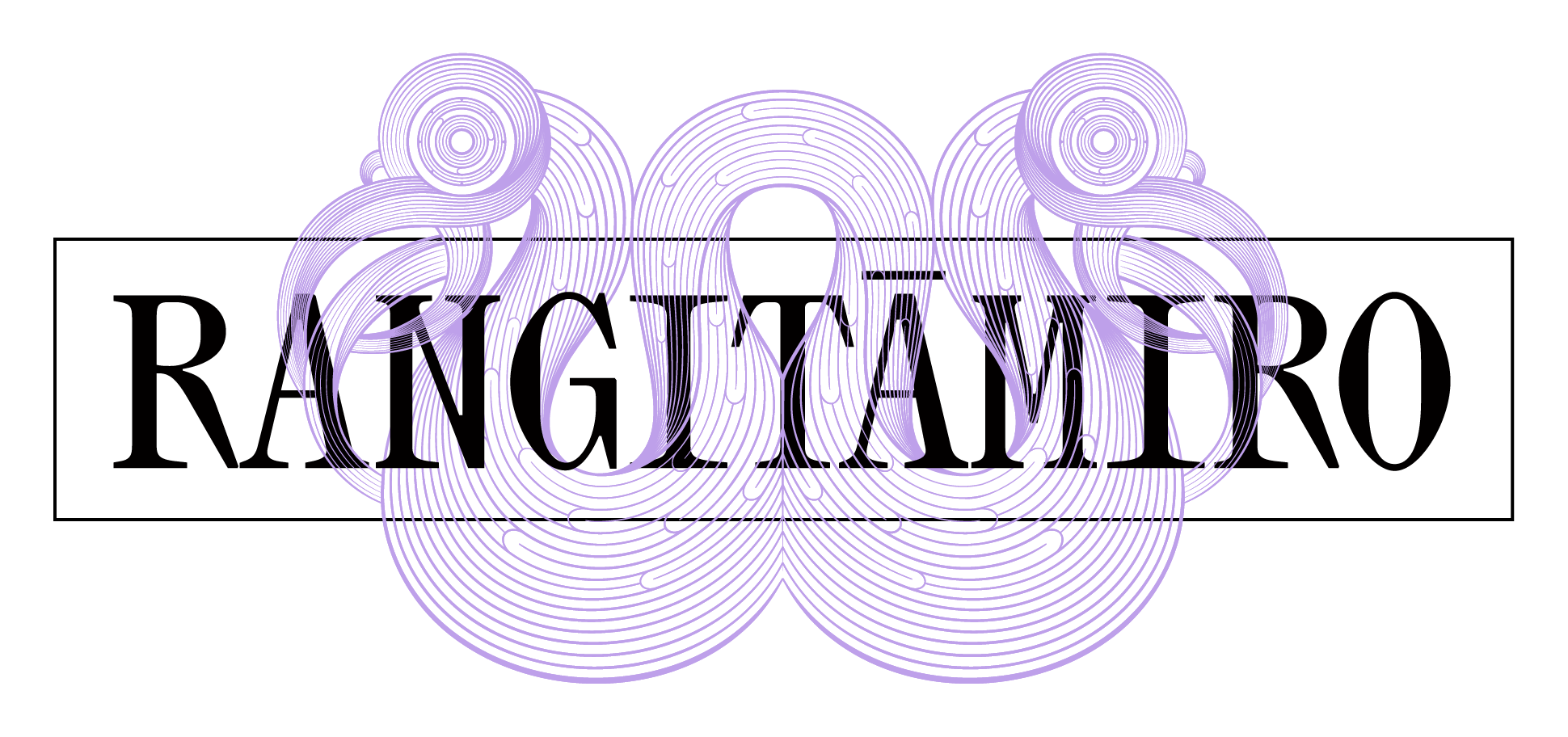
Ko te aroha te taukaea rangitāmiro i a tātou ki a tātou.
Love and care is the thread that binds us all together.
Kia whakarongo ake au ki te tangi a te manu nei, tui, tui, tui tuia.
Tuia te herenga tangata, ka rongo te pō, ka rongo te ao.
Tuia te muka tangata i takea mai i Hawaiki, i te Hono-i-wairua, ki te whai ao ki te mārama.
E kore te puna aroha e mimiti ki te hunga nā rātou i toro i te nukuroa o te puna hauora i ngā tau kua hori. E kore e mōnehunehu te pūmahara ki tō koutou mana nui, tapu nui, mana tiketike. Kei tua o te moana uriuri ko te awatea e whiti mai ana, e ao ko te rangitāmirotanga o ngā tātai hikohiko, e ao ko te rangtiāmirotanga o ngā tātai whakapapa, mā te rangitāmiro i te muka tangata e torokaha ake ai!
‘Rangitāmiro’ is the twisting together of threads and fibres into one strong rope so that it becomes unbreakable. It metaphorically depicts the binding of lineage, the binding of love, the binding of thoughts and the binding of people.
Rangitāmiro is honoured to build on the strong foundations of the Whānau Ora commissioning collective who came before us and to look forward to working alongside you to continue the mahi of this important kaupapa.
Rangitāmiro is a collaborative made up of National Hauora Coalition, Ngaa Pou Hauora oo Taamaki Makaurau Iwi Maaori Partnership Board and Te Tiratū Iwi Māori Partnership Board.
By intertwining the fibres of our people together, we are strengthened. Rangitāmiro is privileged to have the opportunity to embody these words of our tūpuna and strive forward with the ancient knowledge that there is no mana greater than the mana of looking after others – manaaki tangata.
As we prepare for this transition, our priority is to engage with you as a Whānau Ora provider to plan for the future of Whānau Ora together, to provide assurance, and continued support for whānau with the utmost integrity.
Rangitāmiro invites you to connect with us in the way that suits you best, either via email, ā-kōrero with our team, or at an online collective provider hui.
Please reply to rangitamiro@nhc.maori.nz with your preferred method of engagement by Friday 28th March, 3:00 pm so we can begin this transition together and answer any questions you may have. If you do not wish to engage with us, please also let us know.
To stay informed and receive general updates from Rangitāmiro, please visit rangitamiro.nz and subscribe.
Hei konā mai i roto i ngā mihi
Tokoroa whānau share healthcare struggles
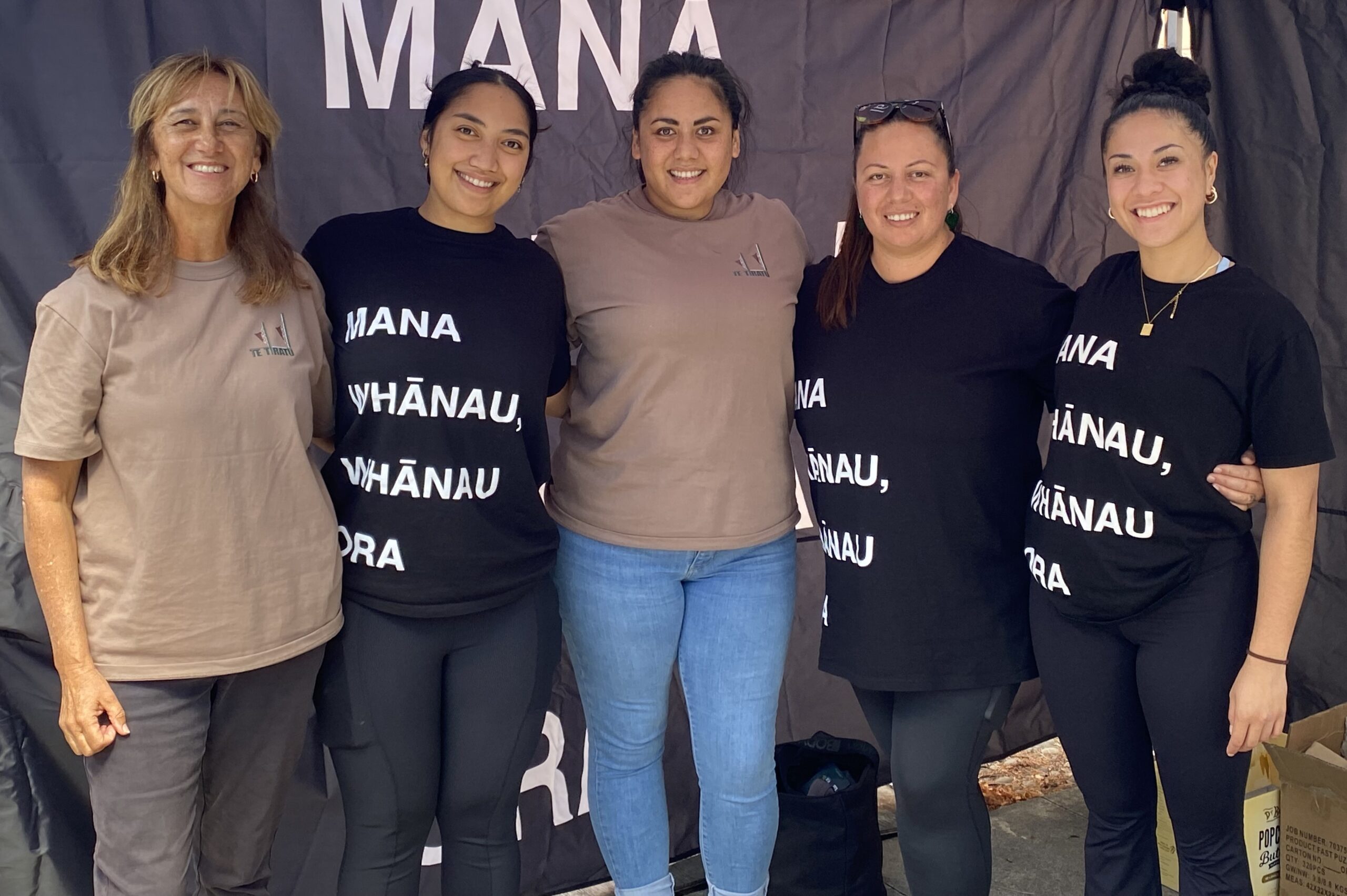
Photo: Our Whānau Voice team in brown Te Tiratū tees, Megan Tunks and Raven Torea with the wahine of National Hauora Coalition in Tokoroa.
A lack of awareness about help they’re entitled to, long wait times, and difficulties with transport to appointments were among the pressing issues raised by whānau at the South Waikato Pacific Islands Community Services Hauora Day, held at Tokoroa Hospital on Saturday. The event, attended by our Whānau Voice team, provided an opportunity to listen to the everyday challenges whānau face in accessing healthcare. They shared concerns about navigating the health system, securing appointments, and the impact of these barriers on their mental well-being.
Navigating the system: A major barrier
One of the most significant challenges whānau raised was the difficulty in understanding what health services they were entitled to and how to access them. Many expressed frustrations over a lack of clear information and support. Booking appointments was another common struggle, with urgent care often easier to access than planned visits. One kuia recalled her experience of seeking advice at a local clinic, only to be directed to an online consultation, which left her feeling unheard and confused.
Impact on mental health & emotional wellbeing
Mental health concerns, particularly for tamariki, were also a recurring theme in conversations. Whānau spoke about the anxiety children experience in emergency departments, the wait time and the stress of dealing with overburdened medical staff. Many lamented the loss of long-term relationships with family doctors, which they felt made healthcare visits these days feel less personal and more rushed. The time it takes to get in to see a GP created a major barrier to healthcare access for whānau, leaving many worried about getting the care they needed when they needed it.
Transport woes: A six-hour journey for healthcare
For kaumātua and those needing specialist care in Waikato, transport was a significant hurdle. Some whānau reported having to leave home at 5:30 AM for an 11:30 AM appointment which is a long day in hospital waiting where food and drinks are expensive, before returning home in the evening. The exhausting ordeal of accessing healthcare underscored the urgent need for better transport solutions.
Listening & learning from whānau
Throughout the day, our Te Tiratū team engaged with service providers, participated in iwi radio discussions, and gained deeper insights into the needs of the Tokoroa community. We are so grateful to all the whānau who took the time to share their whakaaro with us that is being shared with Te Whatu Ora. If you have whakaaro to share, we welcome your voice as we continue to understand and reflect the needs of our people in our regular reporting to Te Whatu Ora.
Rangitāmiro selected as preferred candidate for Whānau Ora commissioning across region 1
MEDIA STATEMENT
FOR IMMEDIATE RELEASE
Friday 28 February 2025, 04:26 PM
2 minutes to Read

National Hauora Coalition, Ngaa Pou Hauora oo Taamaki Makaurau Iwi Maaori Partnership Board and Te Tiratū Iwi Māori Partnership Board are proud to come together under the collaborative entity, Rangitāmiro as the preferred candidate for commissioning Whānau Ora region 1 across Te Tai Tokerau (Northland), Tāmaki Makaurau (Auckland), and Waikato.
The vision set by Kahurangi (Dame) Tariana Turia echoes through our present and future aspirations for Whānau Ora, and we feel immensely privileged to carry out this kaupapa that contributes to fulfilling her legacy, backed by the recognition and confidence of Te Puni Kōkiri (TPK).
Rangitāmiro is honoured to have the opportunity to build on the strong foundations of the Whānau Ora commissioning collective who came before us and to continue the mahi of this important kaupapa alongside current and new providers.
As we embark on this haerenga, our collective expertise, knowledge, and reach in delivering equitable outcomes for our people will ensure that we uphold the aspirations of Whānau Ora for generations to come.
Rangitāmiro is firmly committed to realising the Whānau Ora vision of whānau achieving self-determined success.
As we enter the fi nal phase of the procurement process, we look forward to partnering with TPK to prepare for the commencement of commissioning services from 1 July 2025.
Once the contract is finalised, we will be in touch with providers. Our focus is on working with those who are in and closest to whānau—including iwi, community providers, and whānau—to help build and strengthen the Whānau Ora work already being undertaken and ensure whānau and hapori continue to be at the centre of this transition.
Please direct any media enquiries to: contact@rangitaamiro.nz.
Largest iwi Māori partnership board calls for Māori-focused equity in access
Te Tiratū Iwi Māori Partnership Board that serves 114,000 Māori in the Waikato rohe welcomes the Government’s decision to lower the eligibility age for free bowel cancer screening from 60 to 58 announced today.
“Screening is an essential tool for prevention and early detection, and expanding access will definitely save lives,” said Hagen Tautari, co-chair Te Tiratū Iwi Māori Partnership Board.
“However, what we don’t want is to leave our people who are high-risk behind as they face substantially poorer health outcomes. What we need is an easier diagnostic process that removes systemic barriers.”
Published tested evidence shows that Māori are twice as likely to die from all types of cancer compared to non-Māori.
Research shows the rate of colorectal cancer diagnoses among young Māori under 50 years has increased by an average of 36 percent per decade.
In the rohe Te Tiratū operates Māori cancer numbers are some of the highest in the country.
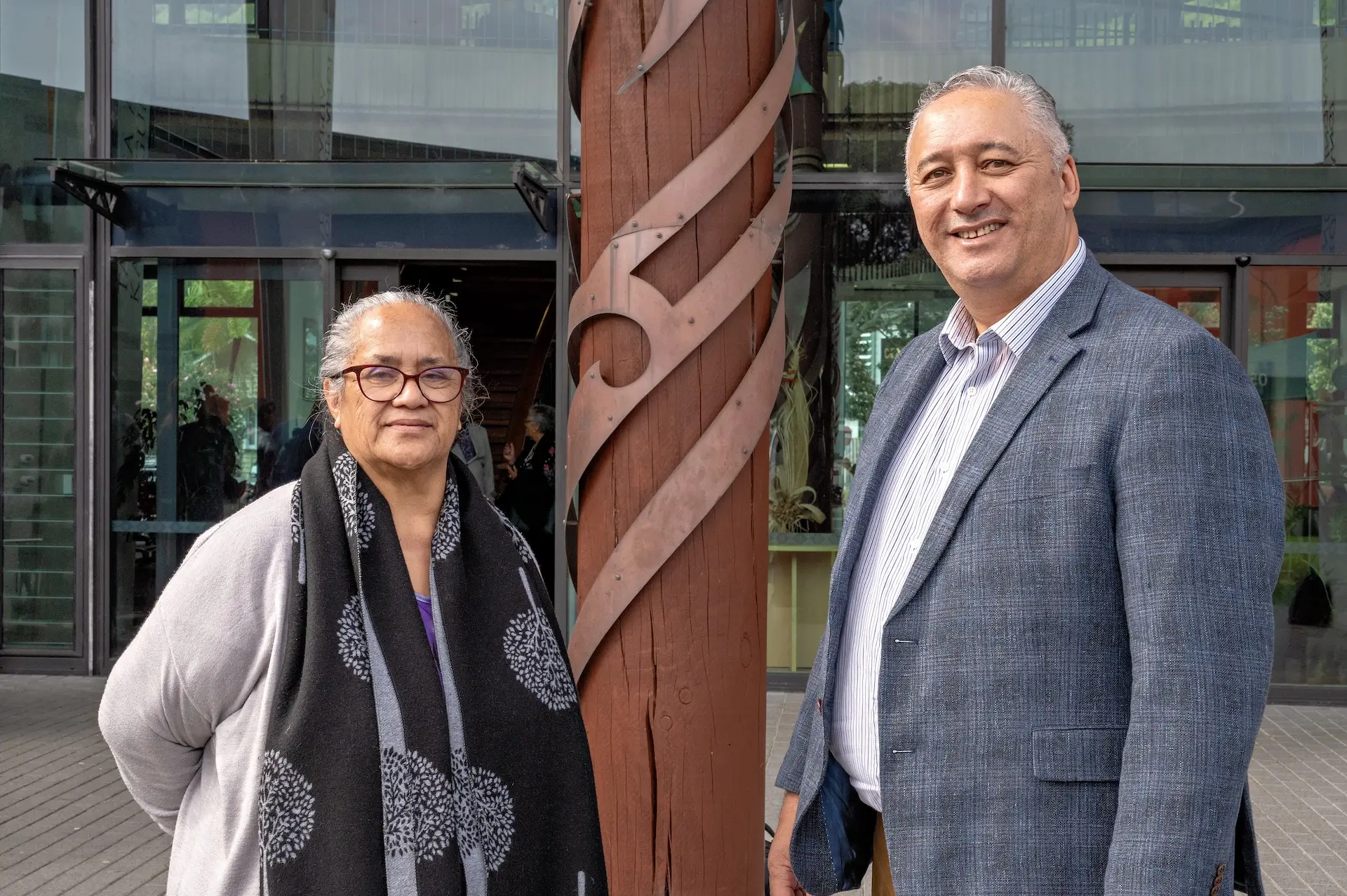
Photo: Co-chairs of Te Tiratū Iwi Māori Partnership Board Kataraina Hodge and Hagen Tautari
While Māori continue to face grave Māori health inequities and significantly lower cancer screening rates, Te Tiratū prioritises prevention as a fundamental step toward improving outcomes.
This adjustment in funding, which moves away from a previously targeted approach for Māori and Pacific communities discontinued in December, raises concerns about whether the expansion will effectively reach and benefit those most at risk.
Pae Tū, the Hauora Māori Strategy is currently being redesigned, following extensive public consultation. Te Tiratū expects it will reflect the needs and expectations of the region to better address the specific needs of Māori and ensure more effective, equitable health outcomes – access to screening being one of them.
Te Tiratū advocates strongly that cancer screening must be culturally appropriate and properly resourced to ensure Māori participation over a lifetime.
It acknowledges that the solutions lie in true partnership between the community and Te Whatu Ora. A prime example is the Taakiri Tuu Wellness and Diagnostic Centre, established in 2024 by Māori health provider Te Kōhao Health in a high-deprivation area, specifically designed to serve whānau Māori.
Kataraina Hodge, co-chair of Te Tiratū Iwi Māori Partnership Board, believes that without targeted strategies, partnerships in community and resourcing for high need populations existing disparities could be reinforced rather than reduced.
Te Tiratū Iwi Māori Partnership Board invites clear commitments by Te Whatu Ora to support:
• Resourcing Māori-led, community-driven promotion of screening.
• Accessible screening locations, particularly in rural areas where services are often out of reach for our whānau.
• Investment in workforce and resources to support increased demand without creating further barriers to timely diagnosis and treatment.
“Te Tiratū remains committed to advocating for hauora solutions that reflect the needs of our people. We urge the Government to engage with Hauora Māori providers and leaders to ensure that screening programmes deliver equitable outcomes—not just increased numbers,” Tautari said.
The Te Tiratū Iwi Māori Partnership Board given their legislative responsibility under the Act monitor and represent local Māori perspectives on the design and delivery of services and public health interventions.
The Board represents the whānau of Pare Hauraki, Waikato, Raukawa, Te Nehenehenui, Ngāti Hāua (Taumarunui) and Te Rūnanga o Kirikiriroa from the localities of Waikato, Hauraki, Maniapoto, Raukawa, Ngāti Hāua.
Sources of Statistics:
Pg 49 Waitangi Tribunal Hauora Report
University of Otago 2024 Early onset cancer on the rise
Pg 17 Te Tiratū Iwi Māori Partnership Board Hauora Priorities Summary Report
Pg 14 Waitangi Tribunal Hautupua Report
Elevating Whānau Voices at Te Matatini 2025
Our dedicated Whānau Voice team from Te Tiratū IMPB, who travel across our rohe, proudly attended Te Matatini o Te Kāhui Maunga 2025 in February.
While 55 incredible groups took the stage at Pukekura/Bowl of Brooklands, the real magic happened behind the scenes—a cherished time of whakawhanaungatanga with the Māori backbone of Hauora.
Ngā mihi nui to Te Punanga o Te Ao Iwi Māori Partnership Board in Taranaki for your manaakitanga. Congratulations to Te Kapa Haka o Ngāti Whakaue for claiming the championship title!
Throughout the event, we connected with a diverse cross-section of hāpori—whānau, dedicated Māori health providers, rangahau leading vital research, expert Hauora advisors, peak bodies, professors, and public servants—all committed to strengthening our collective wellbeing.
Special mihi to all the wonderful kaimahi at Te Atawhai o Te Ao Independent Māori Institute for Environment & Health, New Zealand Heart Foundation, Cancer Society, Te Rau Ora, Toi Tangata, Manawa Ora, Te Ataaranga Trust, Netsafe, Office of Vice Chancellor Māori at Te Whare Wānanga o Waikato, Māori Health Directorate and National Public Health Service at Te Whatu Ora.
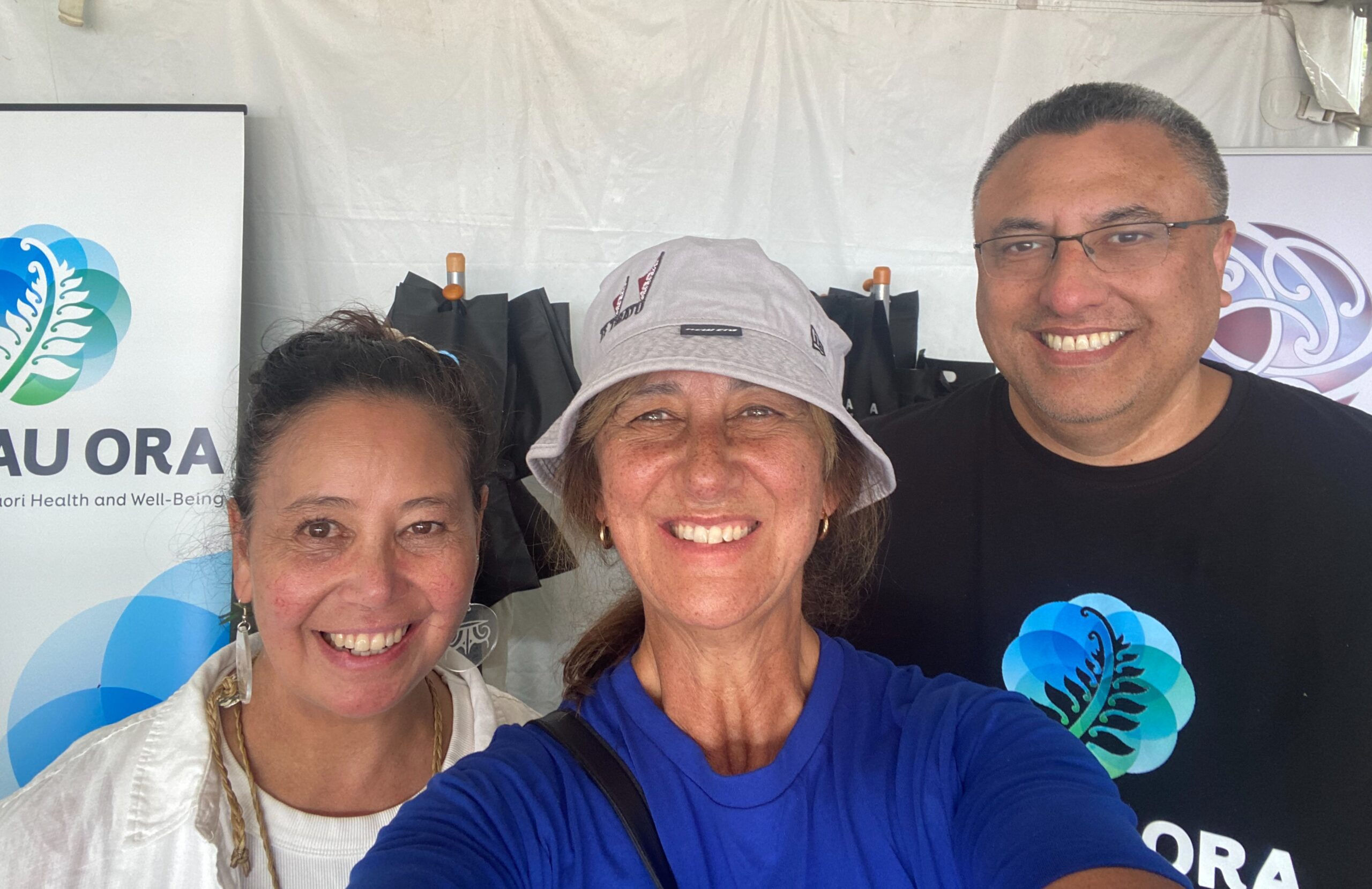
Photo: Marama Tauranga, Chief Nursing Advisor Māori Health Directorate Te Whatu Ora, Megan Tunks Te TiratūIMPB Whanau Voice, Riki Nia Nia CE Te Rau Ora
Keep an eye out for our distinctive Te Tiratū flag flying proudly at local events across the rohe this year!
Our team will be there to listen to whānau about what being healthy and well looks like, what is working well or not working well, what is the biggest health or wellbeing challenge, what would make it easier to access the support, how can health services be improved?
Because the statutory role of Te Tiratū is to advocate for whānau trying to navigate the complex health system, especially with the many changes happening at the moment.
The ripple effects of uncertainty and instability in the health system on whānau are profound, particularly for those facing serious health conditions like cancer.
We tautoko the ongoing pain points faced by whānau when accessing healthcare such as the cost and long wait times for GP appointments, transport and parking issues at hospitals, and lack of kai and comfort during visits.
Through Whānau Voice we are collecting all your whakaaro in our regular reports to Te Whatu Ora to play out part in transforming the health system so it is accessible and equitable for our hāpori.
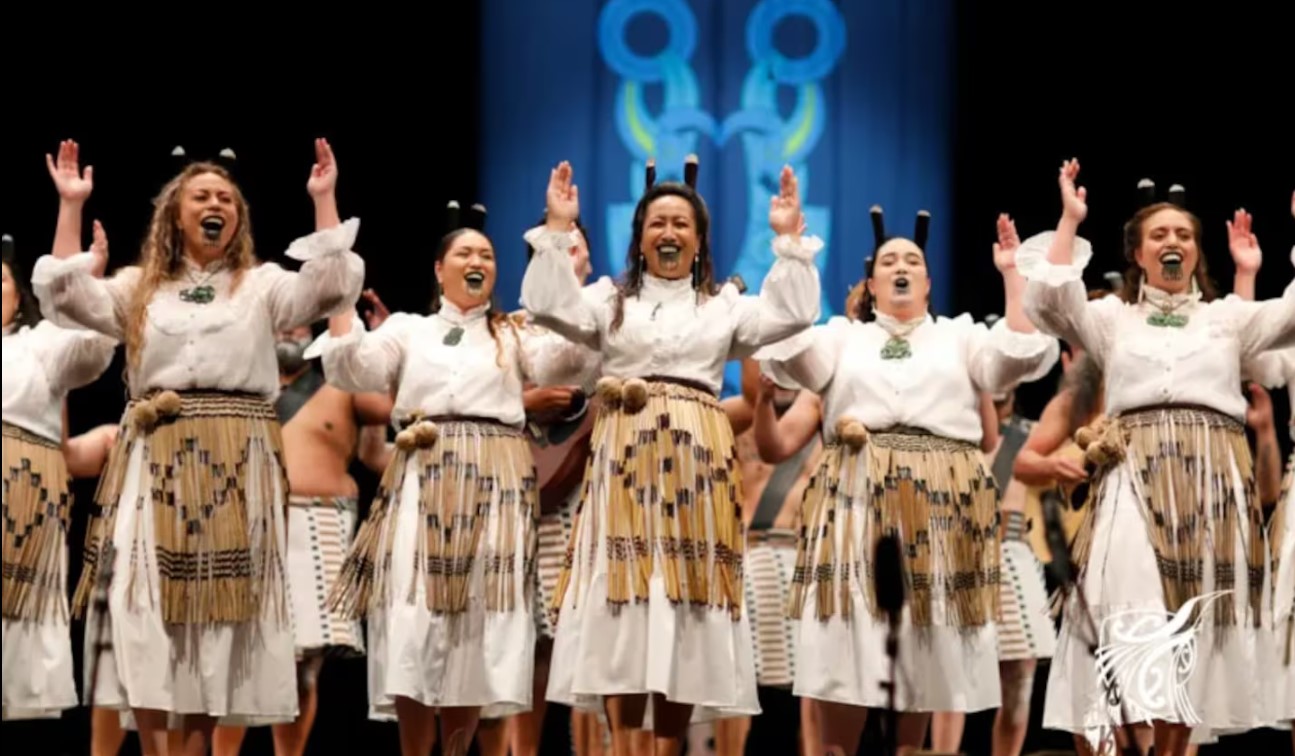
Photo: Credited to Te Matatini Enterprises via NZHerald
Achieving progress & collaboration regionally with Te Manawa Taki IMPB collective
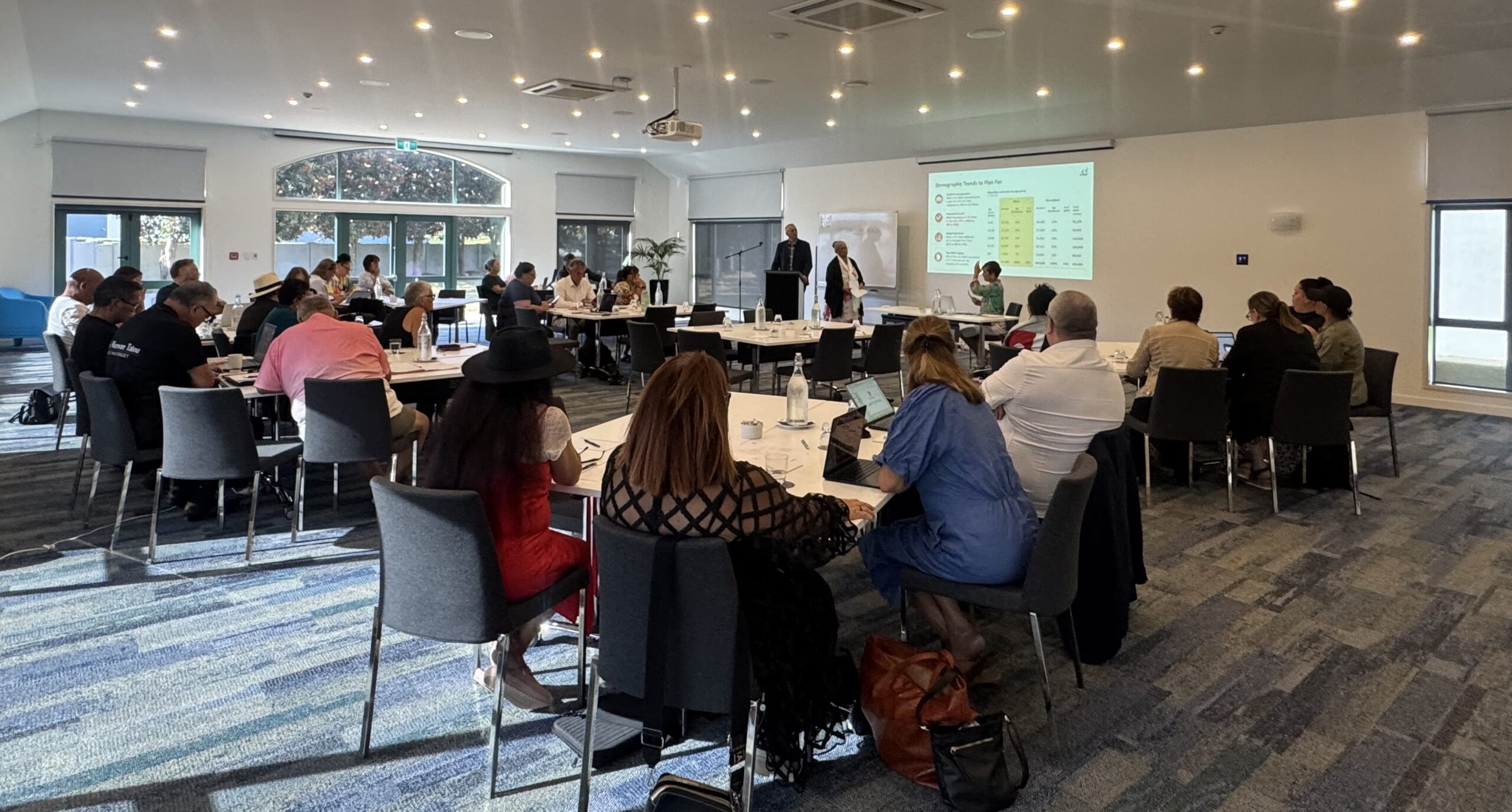
Te Tiratū IMPB hosted the Te Manawa Taki Iwi Māori Partnership Board collective regional hui in Kirikiriroa in February, with six IMPBs participating: Te Tiratū, Toitu Tairāwhiti, Te Moana a Toi, Te Taura Ora o Waiariki, Tūwharetoa, and Te Pūnanga Ora. Presentations included updates from each board, discussions on data platforms, data-sharing agreements, data sovereignty, cyber security and building capacity in data governance. A Pharmac senior executive and Board member explained its role in the health system, its approach to pharmaceutical supply and prioritisation, and the need for earlier engagement with Māori in the decision-making process. Toitu Te Waiora presented on employment training outlining its ongoing work with Māori and Pasifika communities to ensure diverse voices are represented in workforce development. Te Whatu Ora Hauora Māori kaimahi provided a detailed update on the health system’s current status, focus on cost-saving measures, structural changes, and the current review of Pae Tū: Hauora Māori Strategy. They highlighted the appointment of new CEOs and a 12-month task force aimed at improving clinical safety to address regional challenges, particularly in Tairāwhiti and Whakatāne. Moving forward, there is a focus on strengthening governance, enhancing data transparency, and ensuring the sustainability of Māori health priorities within both regional and national health strategies.
